EDU4137 - Behaviourism and Social Constructivism in Learning
VerifiedAdded on 2023/06/10
|13
|3636
|316
Essay
AI Summary
This essay provides a comparative analysis of behaviourism and social constructivism as learning and development perspectives. It explores behaviourist theories such as classical conditioning, operant conditioning, and social learning theory, highlighting their applications and limitations, particularly in comparison to human learning versus animal learning. The essay also discusses social constructivism, emphasizing the role of social and cultural environments in knowledge acquisition and problem-solving. It further examines the advantages and disadvantages of the social constructivism approach, drawing on personal experiences to illustrate the practical implications of both theories in educational settings. The student concludes by reflecting on the effectiveness of different approaches and rewards, noting the importance of tailoring strategies to individual student needs. Desklib offers a wealth of similar solved assignments and study tools for students.
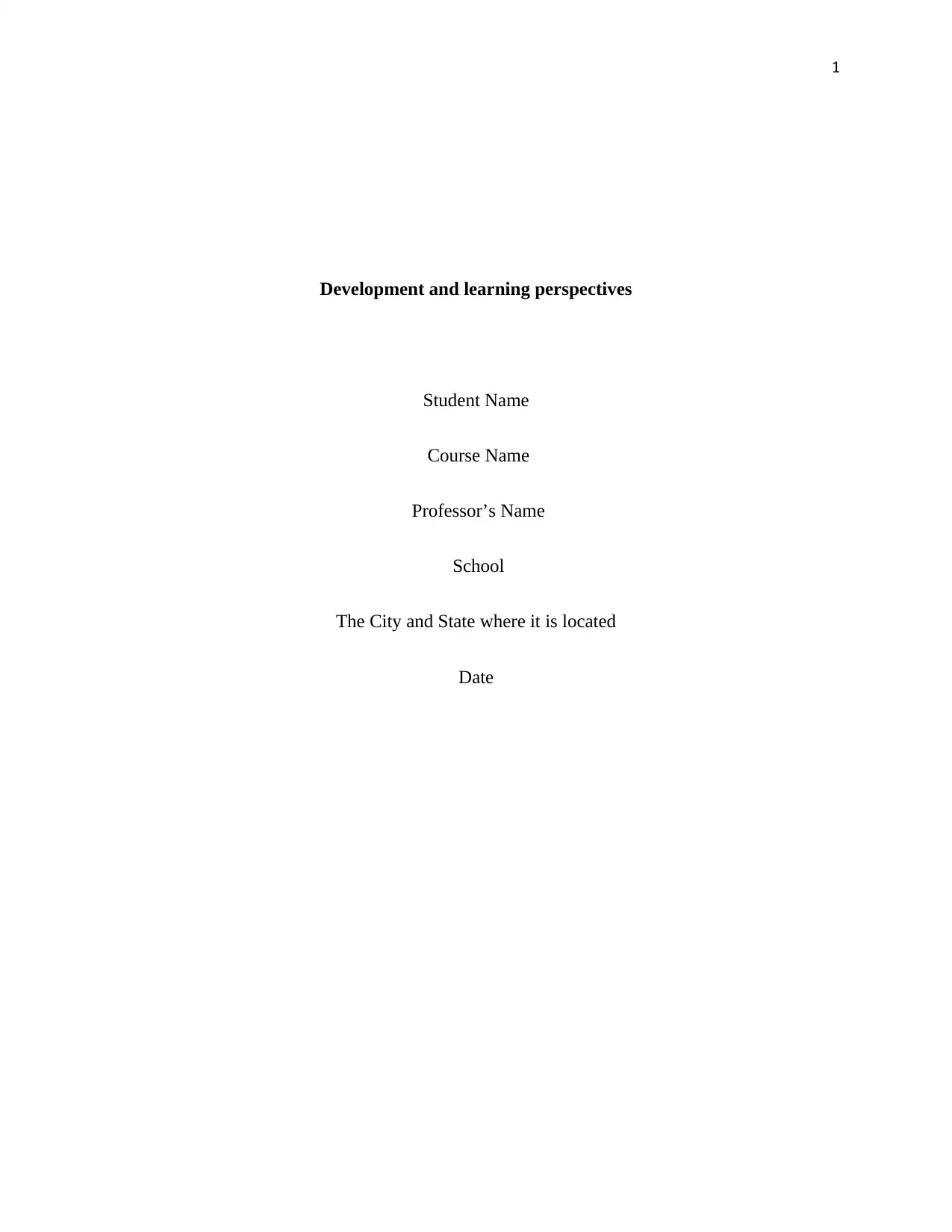
1
Development and learning perspectives
Student Name
Course Name
Professor’s Name
School
The City and State where it is located
Date
Development and learning perspectives
Student Name
Course Name
Professor’s Name
School
The City and State where it is located
Date
Paraphrase This Document
Need a fresh take? Get an instant paraphrase of this document with our AI Paraphraser
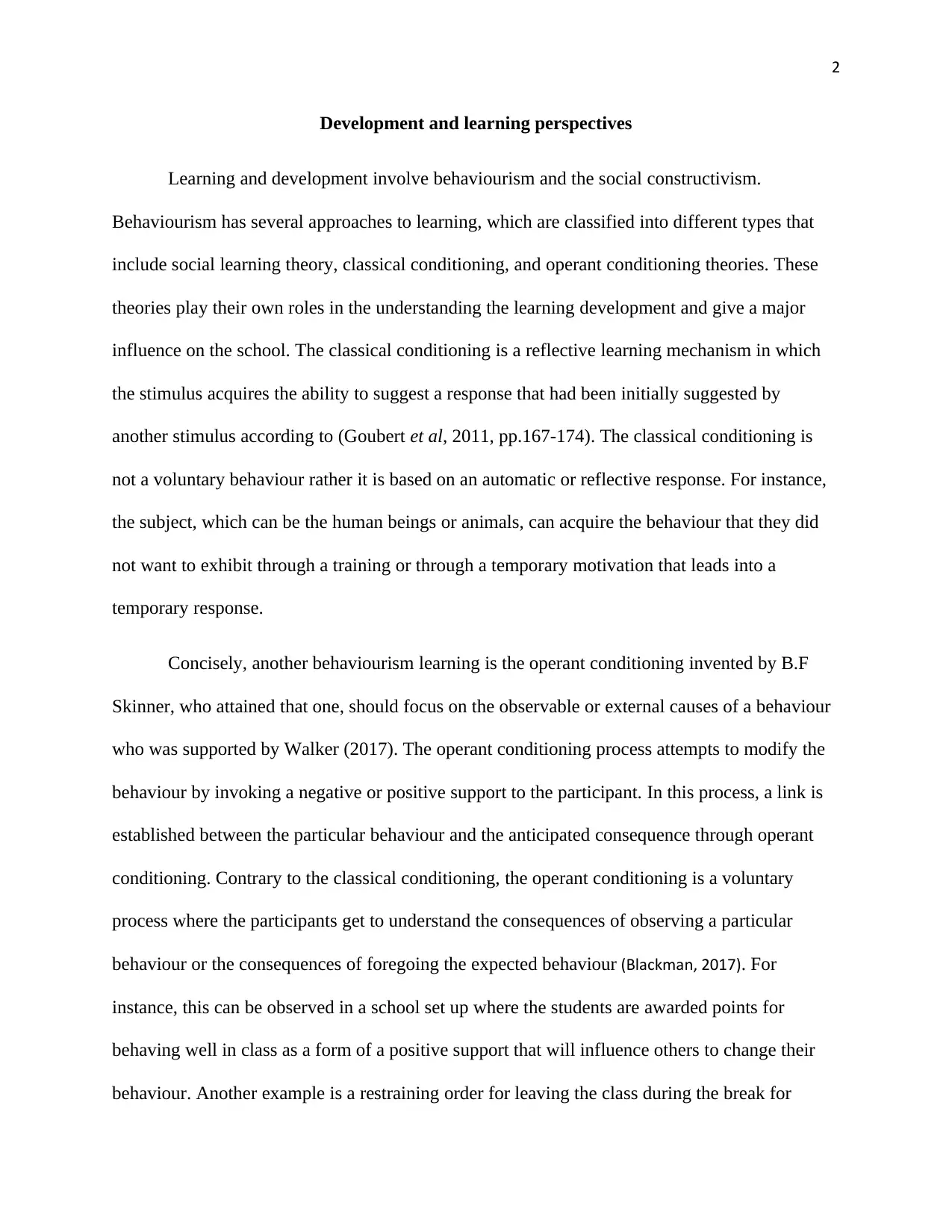
2
Development and learning perspectives
Learning and development involve behaviourism and the social constructivism.
Behaviourism has several approaches to learning, which are classified into different types that
include social learning theory, classical conditioning, and operant conditioning theories. These
theories play their own roles in the understanding the learning development and give a major
influence on the school. The classical conditioning is a reflective learning mechanism in which
the stimulus acquires the ability to suggest a response that had been initially suggested by
another stimulus according to (Goubert et al, 2011, pp.167-174). The classical conditioning is
not a voluntary behaviour rather it is based on an automatic or reflective response. For instance,
the subject, which can be the human beings or animals, can acquire the behaviour that they did
not want to exhibit through a training or through a temporary motivation that leads into a
temporary response.
Concisely, another behaviourism learning is the operant conditioning invented by B.F
Skinner, who attained that one, should focus on the observable or external causes of a behaviour
who was supported by Walker (2017). The operant conditioning process attempts to modify the
behaviour by invoking a negative or positive support to the participant. In this process, a link is
established between the particular behaviour and the anticipated consequence through operant
conditioning. Contrary to the classical conditioning, the operant conditioning is a voluntary
process where the participants get to understand the consequences of observing a particular
behaviour or the consequences of foregoing the expected behaviour (Blackman, 2017). For
instance, this can be observed in a school set up where the students are awarded points for
behaving well in class as a form of a positive support that will influence others to change their
behaviour. Another example is a restraining order for leaving the class during the break for
Development and learning perspectives
Learning and development involve behaviourism and the social constructivism.
Behaviourism has several approaches to learning, which are classified into different types that
include social learning theory, classical conditioning, and operant conditioning theories. These
theories play their own roles in the understanding the learning development and give a major
influence on the school. The classical conditioning is a reflective learning mechanism in which
the stimulus acquires the ability to suggest a response that had been initially suggested by
another stimulus according to (Goubert et al, 2011, pp.167-174). The classical conditioning is
not a voluntary behaviour rather it is based on an automatic or reflective response. For instance,
the subject, which can be the human beings or animals, can acquire the behaviour that they did
not want to exhibit through a training or through a temporary motivation that leads into a
temporary response.
Concisely, another behaviourism learning is the operant conditioning invented by B.F
Skinner, who attained that one, should focus on the observable or external causes of a behaviour
who was supported by Walker (2017). The operant conditioning process attempts to modify the
behaviour by invoking a negative or positive support to the participant. In this process, a link is
established between the particular behaviour and the anticipated consequence through operant
conditioning. Contrary to the classical conditioning, the operant conditioning is a voluntary
process where the participants get to understand the consequences of observing a particular
behaviour or the consequences of foregoing the expected behaviour (Blackman, 2017). For
instance, this can be observed in a school set up where the students are awarded points for
behaving well in class as a form of a positive support that will influence others to change their
behaviour. Another example is a restraining order for leaving the class during the break for
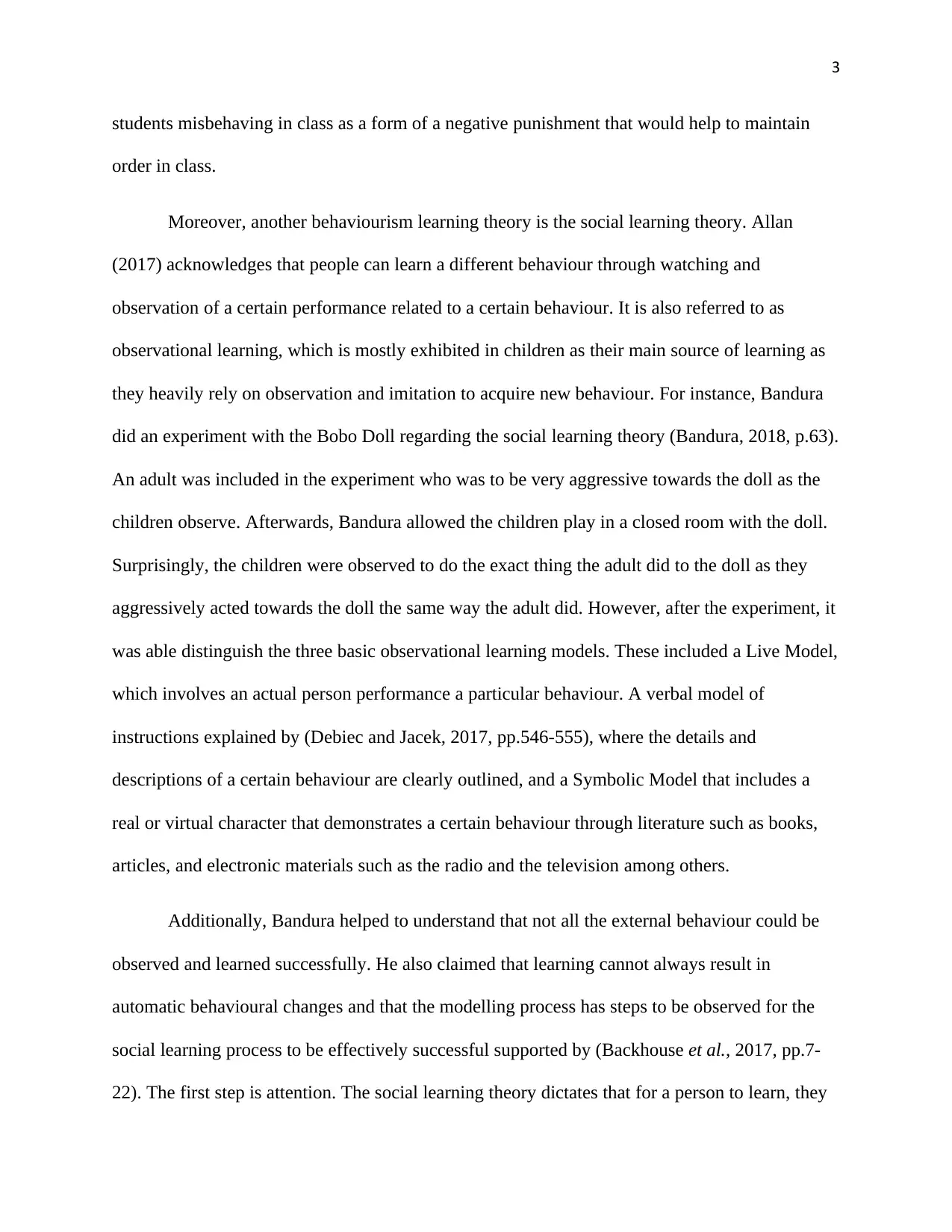
3
students misbehaving in class as a form of a negative punishment that would help to maintain
order in class.
Moreover, another behaviourism learning theory is the social learning theory. Allan
(2017) acknowledges that people can learn a different behaviour through watching and
observation of a certain performance related to a certain behaviour. It is also referred to as
observational learning, which is mostly exhibited in children as their main source of learning as
they heavily rely on observation and imitation to acquire new behaviour. For instance, Bandura
did an experiment with the Bobo Doll regarding the social learning theory (Bandura, 2018, p.63).
An adult was included in the experiment who was to be very aggressive towards the doll as the
children observe. Afterwards, Bandura allowed the children play in a closed room with the doll.
Surprisingly, the children were observed to do the exact thing the adult did to the doll as they
aggressively acted towards the doll the same way the adult did. However, after the experiment, it
was able distinguish the three basic observational learning models. These included a Live Model,
which involves an actual person performance a particular behaviour. A verbal model of
instructions explained by (Debiec and Jacek, 2017, pp.546-555), where the details and
descriptions of a certain behaviour are clearly outlined, and a Symbolic Model that includes a
real or virtual character that demonstrates a certain behaviour through literature such as books,
articles, and electronic materials such as the radio and the television among others.
Additionally, Bandura helped to understand that not all the external behaviour could be
observed and learned successfully. He also claimed that learning cannot always result in
automatic behavioural changes and that the modelling process has steps to be observed for the
social learning process to be effectively successful supported by (Backhouse et al., 2017, pp.7-
22). The first step is attention. The social learning theory dictates that for a person to learn, they
students misbehaving in class as a form of a negative punishment that would help to maintain
order in class.
Moreover, another behaviourism learning theory is the social learning theory. Allan
(2017) acknowledges that people can learn a different behaviour through watching and
observation of a certain performance related to a certain behaviour. It is also referred to as
observational learning, which is mostly exhibited in children as their main source of learning as
they heavily rely on observation and imitation to acquire new behaviour. For instance, Bandura
did an experiment with the Bobo Doll regarding the social learning theory (Bandura, 2018, p.63).
An adult was included in the experiment who was to be very aggressive towards the doll as the
children observe. Afterwards, Bandura allowed the children play in a closed room with the doll.
Surprisingly, the children were observed to do the exact thing the adult did to the doll as they
aggressively acted towards the doll the same way the adult did. However, after the experiment, it
was able distinguish the three basic observational learning models. These included a Live Model,
which involves an actual person performance a particular behaviour. A verbal model of
instructions explained by (Debiec and Jacek, 2017, pp.546-555), where the details and
descriptions of a certain behaviour are clearly outlined, and a Symbolic Model that includes a
real or virtual character that demonstrates a certain behaviour through literature such as books,
articles, and electronic materials such as the radio and the television among others.
Additionally, Bandura helped to understand that not all the external behaviour could be
observed and learned successfully. He also claimed that learning cannot always result in
automatic behavioural changes and that the modelling process has steps to be observed for the
social learning process to be effectively successful supported by (Backhouse et al., 2017, pp.7-
22). The first step is attention. The social learning theory dictates that for a person to learn, they
⊘ This is a preview!⊘
Do you want full access?
Subscribe today to unlock all pages.

Trusted by 1+ million students worldwide
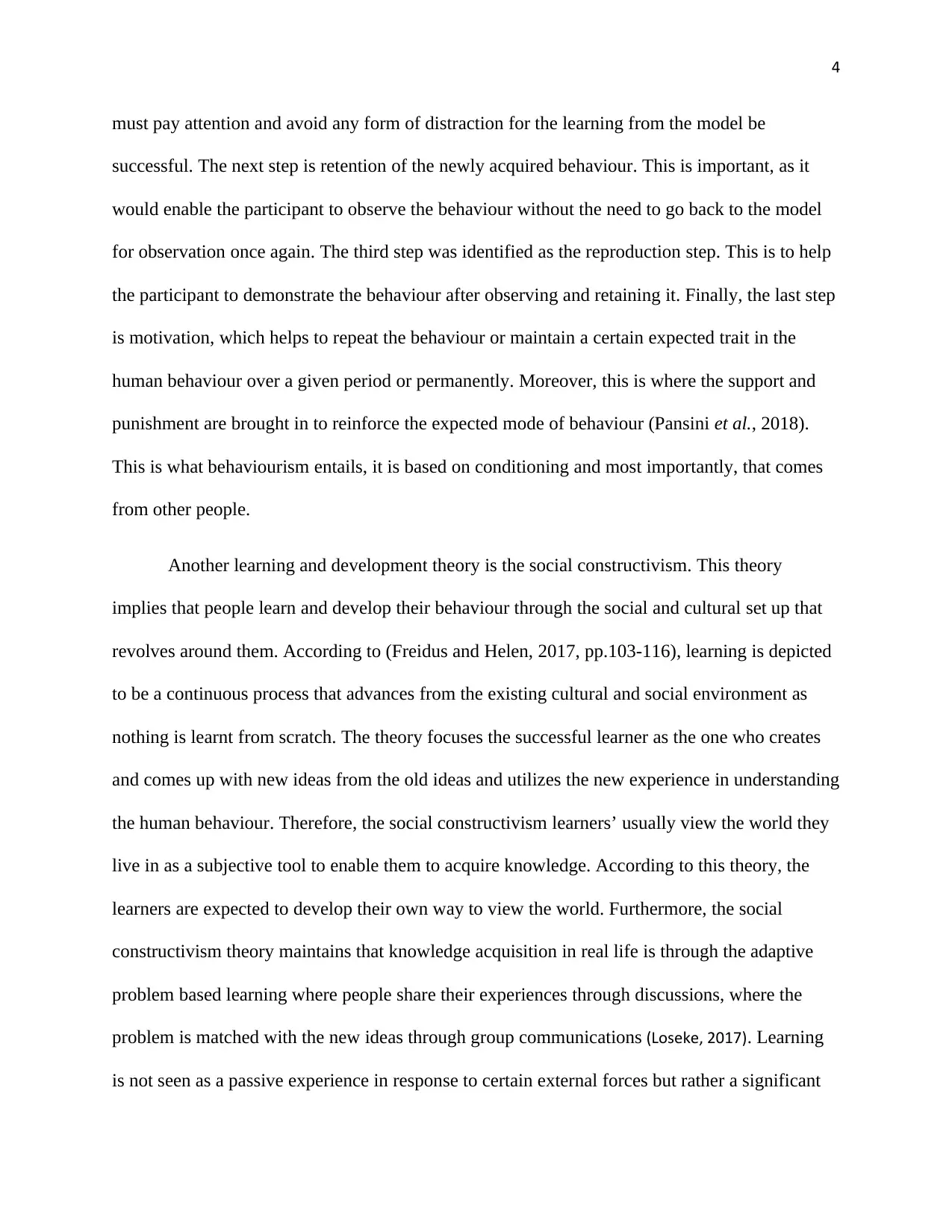
4
must pay attention and avoid any form of distraction for the learning from the model be
successful. The next step is retention of the newly acquired behaviour. This is important, as it
would enable the participant to observe the behaviour without the need to go back to the model
for observation once again. The third step was identified as the reproduction step. This is to help
the participant to demonstrate the behaviour after observing and retaining it. Finally, the last step
is motivation, which helps to repeat the behaviour or maintain a certain expected trait in the
human behaviour over a given period or permanently. Moreover, this is where the support and
punishment are brought in to reinforce the expected mode of behaviour (Pansini et al., 2018).
This is what behaviourism entails, it is based on conditioning and most importantly, that comes
from other people.
Another learning and development theory is the social constructivism. This theory
implies that people learn and develop their behaviour through the social and cultural set up that
revolves around them. According to (Freidus and Helen, 2017, pp.103-116), learning is depicted
to be a continuous process that advances from the existing cultural and social environment as
nothing is learnt from scratch. The theory focuses the successful learner as the one who creates
and comes up with new ideas from the old ideas and utilizes the new experience in understanding
the human behaviour. Therefore, the social constructivism learners’ usually view the world they
live in as a subjective tool to enable them to acquire knowledge. According to this theory, the
learners are expected to develop their own way to view the world. Furthermore, the social
constructivism theory maintains that knowledge acquisition in real life is through the adaptive
problem based learning where people share their experiences through discussions, where the
problem is matched with the new ideas through group communications (Loseke, 2017). Learning
is not seen as a passive experience in response to certain external forces but rather a significant
must pay attention and avoid any form of distraction for the learning from the model be
successful. The next step is retention of the newly acquired behaviour. This is important, as it
would enable the participant to observe the behaviour without the need to go back to the model
for observation once again. The third step was identified as the reproduction step. This is to help
the participant to demonstrate the behaviour after observing and retaining it. Finally, the last step
is motivation, which helps to repeat the behaviour or maintain a certain expected trait in the
human behaviour over a given period or permanently. Moreover, this is where the support and
punishment are brought in to reinforce the expected mode of behaviour (Pansini et al., 2018).
This is what behaviourism entails, it is based on conditioning and most importantly, that comes
from other people.
Another learning and development theory is the social constructivism. This theory
implies that people learn and develop their behaviour through the social and cultural set up that
revolves around them. According to (Freidus and Helen, 2017, pp.103-116), learning is depicted
to be a continuous process that advances from the existing cultural and social environment as
nothing is learnt from scratch. The theory focuses the successful learner as the one who creates
and comes up with new ideas from the old ideas and utilizes the new experience in understanding
the human behaviour. Therefore, the social constructivism learners’ usually view the world they
live in as a subjective tool to enable them to acquire knowledge. According to this theory, the
learners are expected to develop their own way to view the world. Furthermore, the social
constructivism theory maintains that knowledge acquisition in real life is through the adaptive
problem based learning where people share their experiences through discussions, where the
problem is matched with the new ideas through group communications (Loseke, 2017). Learning
is not seen as a passive experience in response to certain external forces but rather a significant
Paraphrase This Document
Need a fresh take? Get an instant paraphrase of this document with our AI Paraphraser
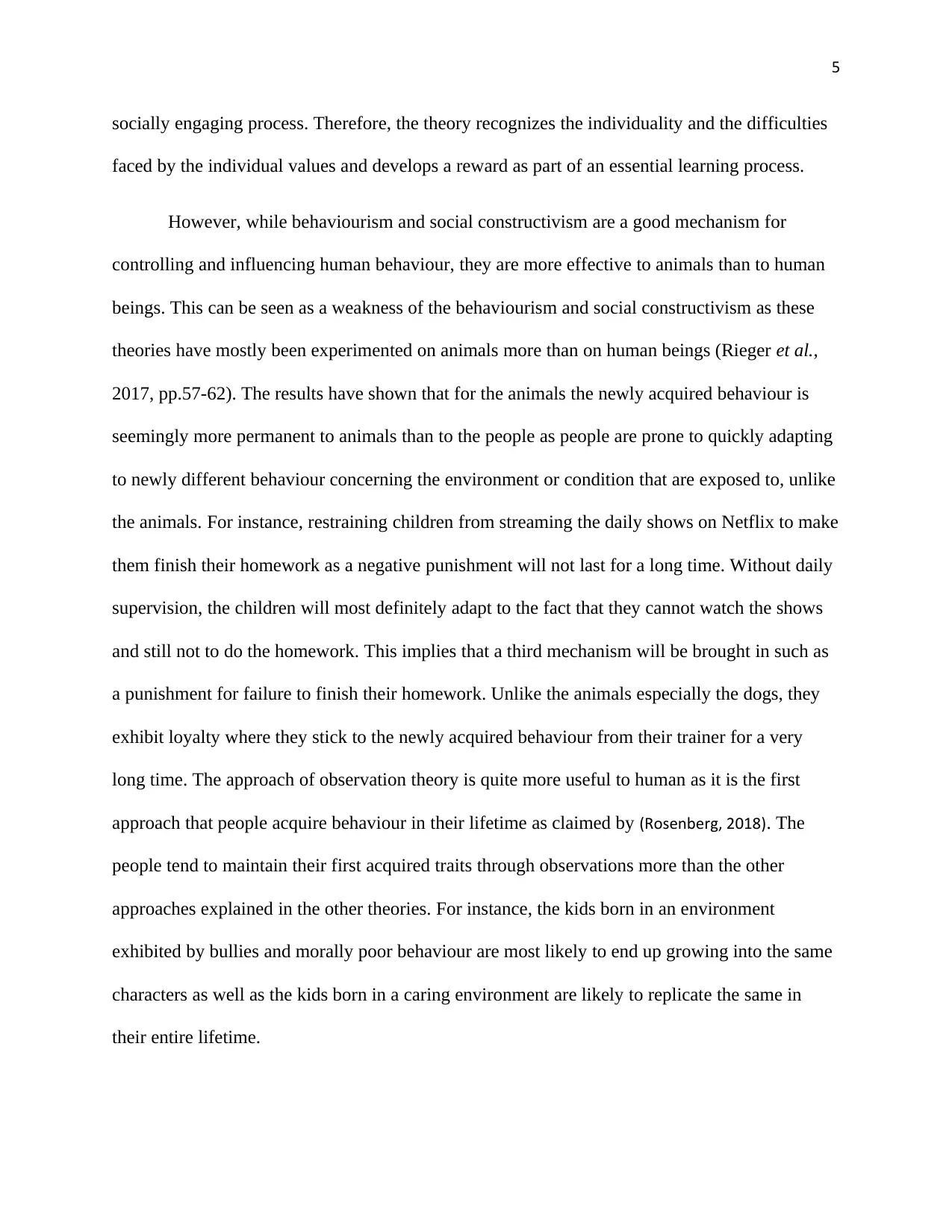
5
socially engaging process. Therefore, the theory recognizes the individuality and the difficulties
faced by the individual values and develops a reward as part of an essential learning process.
However, while behaviourism and social constructivism are a good mechanism for
controlling and influencing human behaviour, they are more effective to animals than to human
beings. This can be seen as a weakness of the behaviourism and social constructivism as these
theories have mostly been experimented on animals more than on human beings (Rieger et al.,
2017, pp.57-62). The results have shown that for the animals the newly acquired behaviour is
seemingly more permanent to animals than to the people as people are prone to quickly adapting
to newly different behaviour concerning the environment or condition that are exposed to, unlike
the animals. For instance, restraining children from streaming the daily shows on Netflix to make
them finish their homework as a negative punishment will not last for a long time. Without daily
supervision, the children will most definitely adapt to the fact that they cannot watch the shows
and still not to do the homework. This implies that a third mechanism will be brought in such as
a punishment for failure to finish their homework. Unlike the animals especially the dogs, they
exhibit loyalty where they stick to the newly acquired behaviour from their trainer for a very
long time. The approach of observation theory is quite more useful to human as it is the first
approach that people acquire behaviour in their lifetime as claimed by (Rosenberg, 2018). The
people tend to maintain their first acquired traits through observations more than the other
approaches explained in the other theories. For instance, the kids born in an environment
exhibited by bullies and morally poor behaviour are most likely to end up growing into the same
characters as well as the kids born in a caring environment are likely to replicate the same in
their entire lifetime.
socially engaging process. Therefore, the theory recognizes the individuality and the difficulties
faced by the individual values and develops a reward as part of an essential learning process.
However, while behaviourism and social constructivism are a good mechanism for
controlling and influencing human behaviour, they are more effective to animals than to human
beings. This can be seen as a weakness of the behaviourism and social constructivism as these
theories have mostly been experimented on animals more than on human beings (Rieger et al.,
2017, pp.57-62). The results have shown that for the animals the newly acquired behaviour is
seemingly more permanent to animals than to the people as people are prone to quickly adapting
to newly different behaviour concerning the environment or condition that are exposed to, unlike
the animals. For instance, restraining children from streaming the daily shows on Netflix to make
them finish their homework as a negative punishment will not last for a long time. Without daily
supervision, the children will most definitely adapt to the fact that they cannot watch the shows
and still not to do the homework. This implies that a third mechanism will be brought in such as
a punishment for failure to finish their homework. Unlike the animals especially the dogs, they
exhibit loyalty where they stick to the newly acquired behaviour from their trainer for a very
long time. The approach of observation theory is quite more useful to human as it is the first
approach that people acquire behaviour in their lifetime as claimed by (Rosenberg, 2018). The
people tend to maintain their first acquired traits through observations more than the other
approaches explained in the other theories. For instance, the kids born in an environment
exhibited by bullies and morally poor behaviour are most likely to end up growing into the same
characters as well as the kids born in a caring environment are likely to replicate the same in
their entire lifetime.
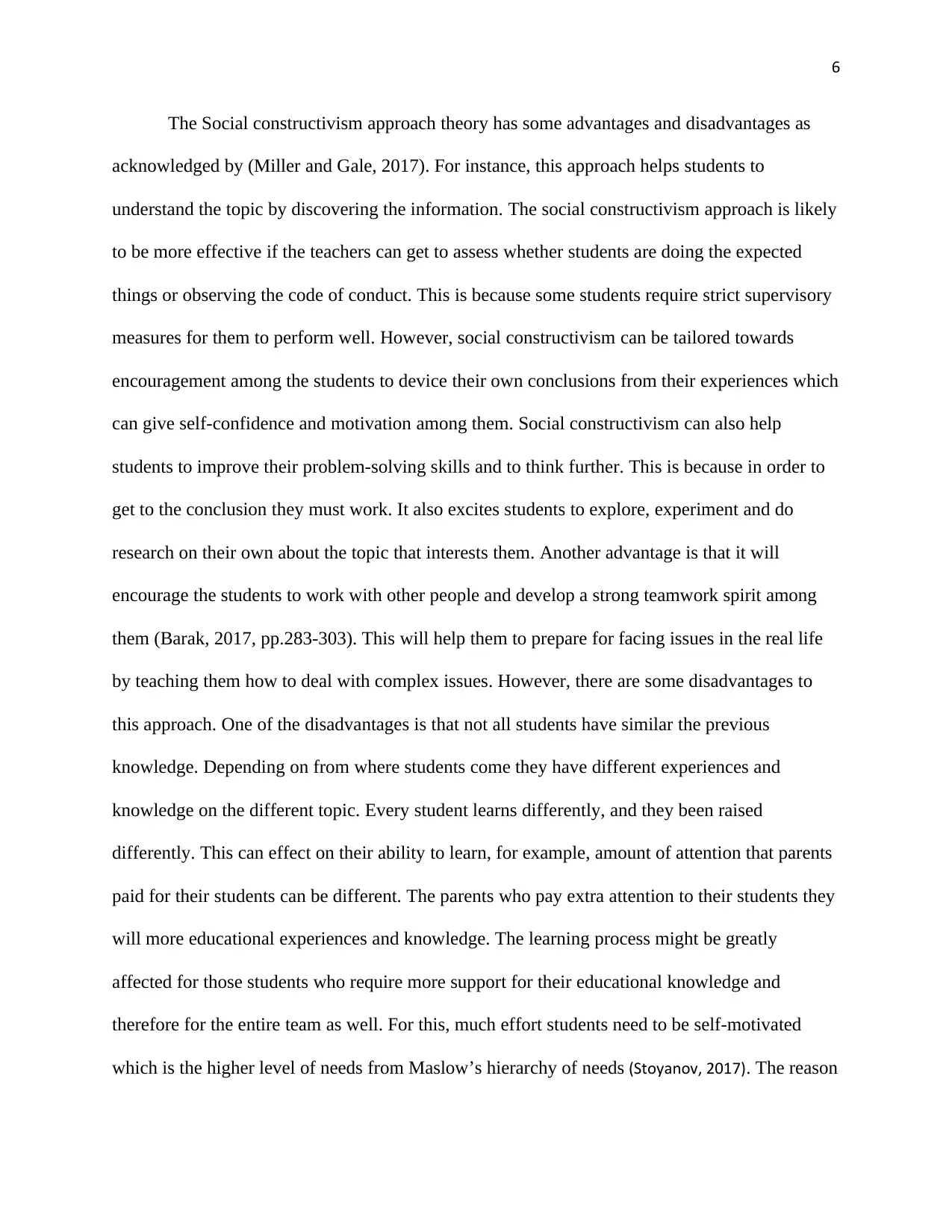
6
The Social constructivism approach theory has some advantages and disadvantages as
acknowledged by (Miller and Gale, 2017). For instance, this approach helps students to
understand the topic by discovering the information. The social constructivism approach is likely
to be more effective if the teachers can get to assess whether students are doing the expected
things or observing the code of conduct. This is because some students require strict supervisory
measures for them to perform well. However, social constructivism can be tailored towards
encouragement among the students to device their own conclusions from their experiences which
can give self-confidence and motivation among them. Social constructivism can also help
students to improve their problem-solving skills and to think further. This is because in order to
get to the conclusion they must work. It also excites students to explore, experiment and do
research on their own about the topic that interests them. Another advantage is that it will
encourage the students to work with other people and develop a strong teamwork spirit among
them (Barak, 2017, pp.283-303). This will help them to prepare for facing issues in the real life
by teaching them how to deal with complex issues. However, there are some disadvantages to
this approach. One of the disadvantages is that not all students have similar the previous
knowledge. Depending on from where students come they have different experiences and
knowledge on the different topic. Every student learns differently, and they been raised
differently. This can effect on their ability to learn, for example, amount of attention that parents
paid for their students can be different. The parents who pay extra attention to their students they
will more educational experiences and knowledge. The learning process might be greatly
affected for those students who require more support for their educational knowledge and
therefore for the entire team as well. For this, much effort students need to be self-motivated
which is the higher level of needs from Maslow’s hierarchy of needs (Stoyanov, 2017). The reason
The Social constructivism approach theory has some advantages and disadvantages as
acknowledged by (Miller and Gale, 2017). For instance, this approach helps students to
understand the topic by discovering the information. The social constructivism approach is likely
to be more effective if the teachers can get to assess whether students are doing the expected
things or observing the code of conduct. This is because some students require strict supervisory
measures for them to perform well. However, social constructivism can be tailored towards
encouragement among the students to device their own conclusions from their experiences which
can give self-confidence and motivation among them. Social constructivism can also help
students to improve their problem-solving skills and to think further. This is because in order to
get to the conclusion they must work. It also excites students to explore, experiment and do
research on their own about the topic that interests them. Another advantage is that it will
encourage the students to work with other people and develop a strong teamwork spirit among
them (Barak, 2017, pp.283-303). This will help them to prepare for facing issues in the real life
by teaching them how to deal with complex issues. However, there are some disadvantages to
this approach. One of the disadvantages is that not all students have similar the previous
knowledge. Depending on from where students come they have different experiences and
knowledge on the different topic. Every student learns differently, and they been raised
differently. This can effect on their ability to learn, for example, amount of attention that parents
paid for their students can be different. The parents who pay extra attention to their students they
will more educational experiences and knowledge. The learning process might be greatly
affected for those students who require more support for their educational knowledge and
therefore for the entire team as well. For this, much effort students need to be self-motivated
which is the higher level of needs from Maslow’s hierarchy of needs (Stoyanov, 2017). The reason
⊘ This is a preview!⊘
Do you want full access?
Subscribe today to unlock all pages.

Trusted by 1+ million students worldwide
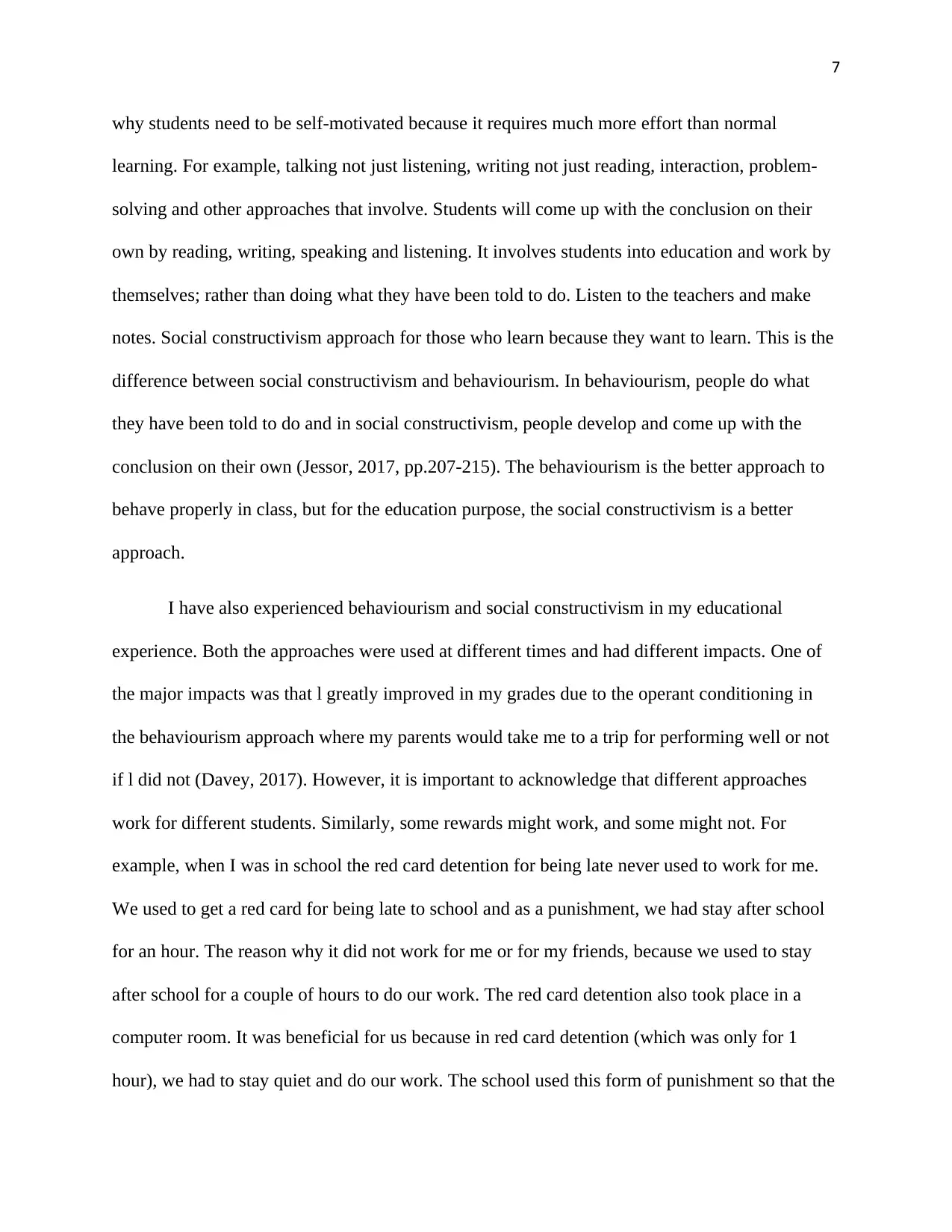
7
why students need to be self-motivated because it requires much more effort than normal
learning. For example, talking not just listening, writing not just reading, interaction, problem-
solving and other approaches that involve. Students will come up with the conclusion on their
own by reading, writing, speaking and listening. It involves students into education and work by
themselves; rather than doing what they have been told to do. Listen to the teachers and make
notes. Social constructivism approach for those who learn because they want to learn. This is the
difference between social constructivism and behaviourism. In behaviourism, people do what
they have been told to do and in social constructivism, people develop and come up with the
conclusion on their own (Jessor, 2017, pp.207-215). The behaviourism is the better approach to
behave properly in class, but for the education purpose, the social constructivism is a better
approach.
I have also experienced behaviourism and social constructivism in my educational
experience. Both the approaches were used at different times and had different impacts. One of
the major impacts was that l greatly improved in my grades due to the operant conditioning in
the behaviourism approach where my parents would take me to a trip for performing well or not
if l did not (Davey, 2017). However, it is important to acknowledge that different approaches
work for different students. Similarly, some rewards might work, and some might not. For
example, when I was in school the red card detention for being late never used to work for me.
We used to get a red card for being late to school and as a punishment, we had stay after school
for an hour. The reason why it did not work for me or for my friends, because we used to stay
after school for a couple of hours to do our work. The red card detention also took place in a
computer room. It was beneficial for us because in red card detention (which was only for 1
hour), we had to stay quiet and do our work. The school used this form of punishment so that the
why students need to be self-motivated because it requires much more effort than normal
learning. For example, talking not just listening, writing not just reading, interaction, problem-
solving and other approaches that involve. Students will come up with the conclusion on their
own by reading, writing, speaking and listening. It involves students into education and work by
themselves; rather than doing what they have been told to do. Listen to the teachers and make
notes. Social constructivism approach for those who learn because they want to learn. This is the
difference between social constructivism and behaviourism. In behaviourism, people do what
they have been told to do and in social constructivism, people develop and come up with the
conclusion on their own (Jessor, 2017, pp.207-215). The behaviourism is the better approach to
behave properly in class, but for the education purpose, the social constructivism is a better
approach.
I have also experienced behaviourism and social constructivism in my educational
experience. Both the approaches were used at different times and had different impacts. One of
the major impacts was that l greatly improved in my grades due to the operant conditioning in
the behaviourism approach where my parents would take me to a trip for performing well or not
if l did not (Davey, 2017). However, it is important to acknowledge that different approaches
work for different students. Similarly, some rewards might work, and some might not. For
example, when I was in school the red card detention for being late never used to work for me.
We used to get a red card for being late to school and as a punishment, we had stay after school
for an hour. The reason why it did not work for me or for my friends, because we used to stay
after school for a couple of hours to do our work. The red card detention also took place in a
computer room. It was beneficial for us because in red card detention (which was only for 1
hour), we had to stay quiet and do our work. The school used this form of punishment so that the
Paraphrase This Document
Need a fresh take? Get an instant paraphrase of this document with our AI Paraphraser
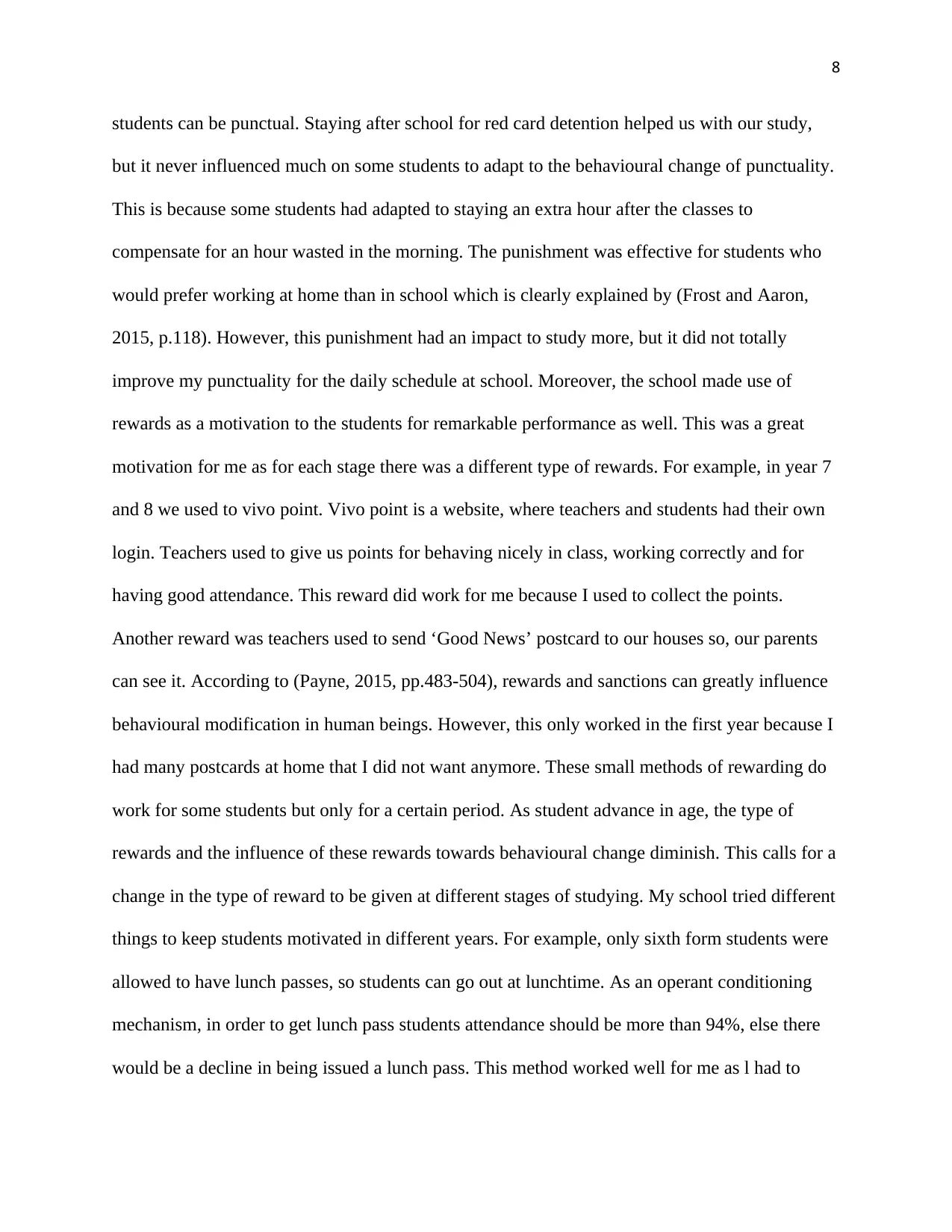
8
students can be punctual. Staying after school for red card detention helped us with our study,
but it never influenced much on some students to adapt to the behavioural change of punctuality.
This is because some students had adapted to staying an extra hour after the classes to
compensate for an hour wasted in the morning. The punishment was effective for students who
would prefer working at home than in school which is clearly explained by (Frost and Aaron,
2015, p.118). However, this punishment had an impact to study more, but it did not totally
improve my punctuality for the daily schedule at school. Moreover, the school made use of
rewards as a motivation to the students for remarkable performance as well. This was a great
motivation for me as for each stage there was a different type of rewards. For example, in year 7
and 8 we used to vivo point. Vivo point is a website, where teachers and students had their own
login. Teachers used to give us points for behaving nicely in class, working correctly and for
having good attendance. This reward did work for me because I used to collect the points.
Another reward was teachers used to send ‘Good News’ postcard to our houses so, our parents
can see it. According to (Payne, 2015, pp.483-504), rewards and sanctions can greatly influence
behavioural modification in human beings. However, this only worked in the first year because I
had many postcards at home that I did not want anymore. These small methods of rewarding do
work for some students but only for a certain period. As student advance in age, the type of
rewards and the influence of these rewards towards behavioural change diminish. This calls for a
change in the type of reward to be given at different stages of studying. My school tried different
things to keep students motivated in different years. For example, only sixth form students were
allowed to have lunch passes, so students can go out at lunchtime. As an operant conditioning
mechanism, in order to get lunch pass students attendance should be more than 94%, else there
would be a decline in being issued a lunch pass. This method worked well for me as l had to
students can be punctual. Staying after school for red card detention helped us with our study,
but it never influenced much on some students to adapt to the behavioural change of punctuality.
This is because some students had adapted to staying an extra hour after the classes to
compensate for an hour wasted in the morning. The punishment was effective for students who
would prefer working at home than in school which is clearly explained by (Frost and Aaron,
2015, p.118). However, this punishment had an impact to study more, but it did not totally
improve my punctuality for the daily schedule at school. Moreover, the school made use of
rewards as a motivation to the students for remarkable performance as well. This was a great
motivation for me as for each stage there was a different type of rewards. For example, in year 7
and 8 we used to vivo point. Vivo point is a website, where teachers and students had their own
login. Teachers used to give us points for behaving nicely in class, working correctly and for
having good attendance. This reward did work for me because I used to collect the points.
Another reward was teachers used to send ‘Good News’ postcard to our houses so, our parents
can see it. According to (Payne, 2015, pp.483-504), rewards and sanctions can greatly influence
behavioural modification in human beings. However, this only worked in the first year because I
had many postcards at home that I did not want anymore. These small methods of rewarding do
work for some students but only for a certain period. As student advance in age, the type of
rewards and the influence of these rewards towards behavioural change diminish. This calls for a
change in the type of reward to be given at different stages of studying. My school tried different
things to keep students motivated in different years. For example, only sixth form students were
allowed to have lunch passes, so students can go out at lunchtime. As an operant conditioning
mechanism, in order to get lunch pass students attendance should be more than 94%, else there
would be a decline in being issued a lunch pass. This method worked well for me as l had to
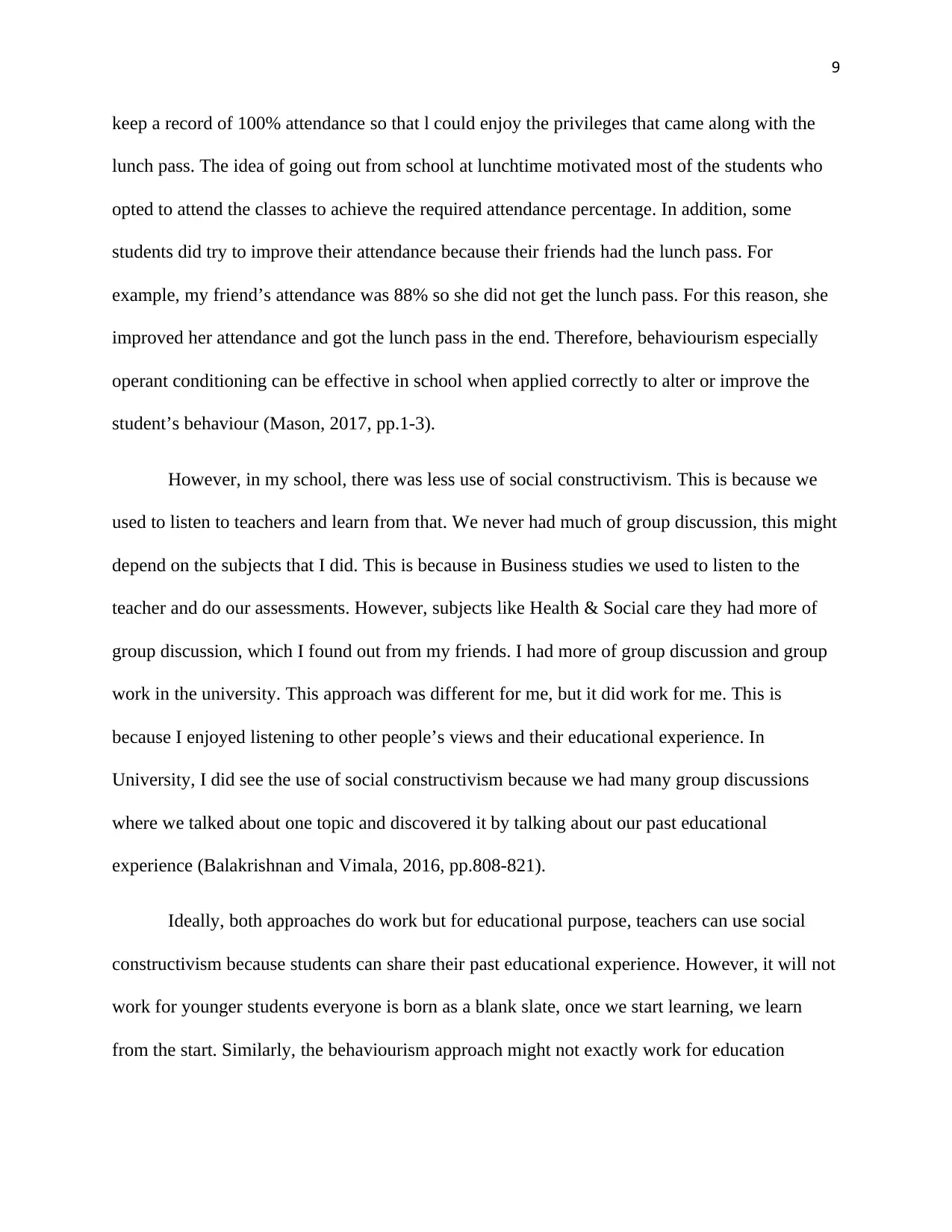
9
keep a record of 100% attendance so that l could enjoy the privileges that came along with the
lunch pass. The idea of going out from school at lunchtime motivated most of the students who
opted to attend the classes to achieve the required attendance percentage. In addition, some
students did try to improve their attendance because their friends had the lunch pass. For
example, my friend’s attendance was 88% so she did not get the lunch pass. For this reason, she
improved her attendance and got the lunch pass in the end. Therefore, behaviourism especially
operant conditioning can be effective in school when applied correctly to alter or improve the
student’s behaviour (Mason, 2017, pp.1-3).
However, in my school, there was less use of social constructivism. This is because we
used to listen to teachers and learn from that. We never had much of group discussion, this might
depend on the subjects that I did. This is because in Business studies we used to listen to the
teacher and do our assessments. However, subjects like Health & Social care they had more of
group discussion, which I found out from my friends. I had more of group discussion and group
work in the university. This approach was different for me, but it did work for me. This is
because I enjoyed listening to other people’s views and their educational experience. In
University, I did see the use of social constructivism because we had many group discussions
where we talked about one topic and discovered it by talking about our past educational
experience (Balakrishnan and Vimala, 2016, pp.808-821).
Ideally, both approaches do work but for educational purpose, teachers can use social
constructivism because students can share their past educational experience. However, it will not
work for younger students everyone is born as a blank slate, once we start learning, we learn
from the start. Similarly, the behaviourism approach might not exactly work for education
keep a record of 100% attendance so that l could enjoy the privileges that came along with the
lunch pass. The idea of going out from school at lunchtime motivated most of the students who
opted to attend the classes to achieve the required attendance percentage. In addition, some
students did try to improve their attendance because their friends had the lunch pass. For
example, my friend’s attendance was 88% so she did not get the lunch pass. For this reason, she
improved her attendance and got the lunch pass in the end. Therefore, behaviourism especially
operant conditioning can be effective in school when applied correctly to alter or improve the
student’s behaviour (Mason, 2017, pp.1-3).
However, in my school, there was less use of social constructivism. This is because we
used to listen to teachers and learn from that. We never had much of group discussion, this might
depend on the subjects that I did. This is because in Business studies we used to listen to the
teacher and do our assessments. However, subjects like Health & Social care they had more of
group discussion, which I found out from my friends. I had more of group discussion and group
work in the university. This approach was different for me, but it did work for me. This is
because I enjoyed listening to other people’s views and their educational experience. In
University, I did see the use of social constructivism because we had many group discussions
where we talked about one topic and discovered it by talking about our past educational
experience (Balakrishnan and Vimala, 2016, pp.808-821).
Ideally, both approaches do work but for educational purpose, teachers can use social
constructivism because students can share their past educational experience. However, it will not
work for younger students everyone is born as a blank slate, once we start learning, we learn
from the start. Similarly, the behaviourism approach might not exactly work for education
⊘ This is a preview!⊘
Do you want full access?
Subscribe today to unlock all pages.

Trusted by 1+ million students worldwide

10
purpose, but it will to improve students’ behaviour. Teachers or school can provide different
methods of motivation to influence the behaviour of students in a positive way (Cherry, 2017).
purpose, but it will to improve students’ behaviour. Teachers or school can provide different
methods of motivation to influence the behaviour of students in a positive way (Cherry, 2017).
Paraphrase This Document
Need a fresh take? Get an instant paraphrase of this document with our AI Paraphraser
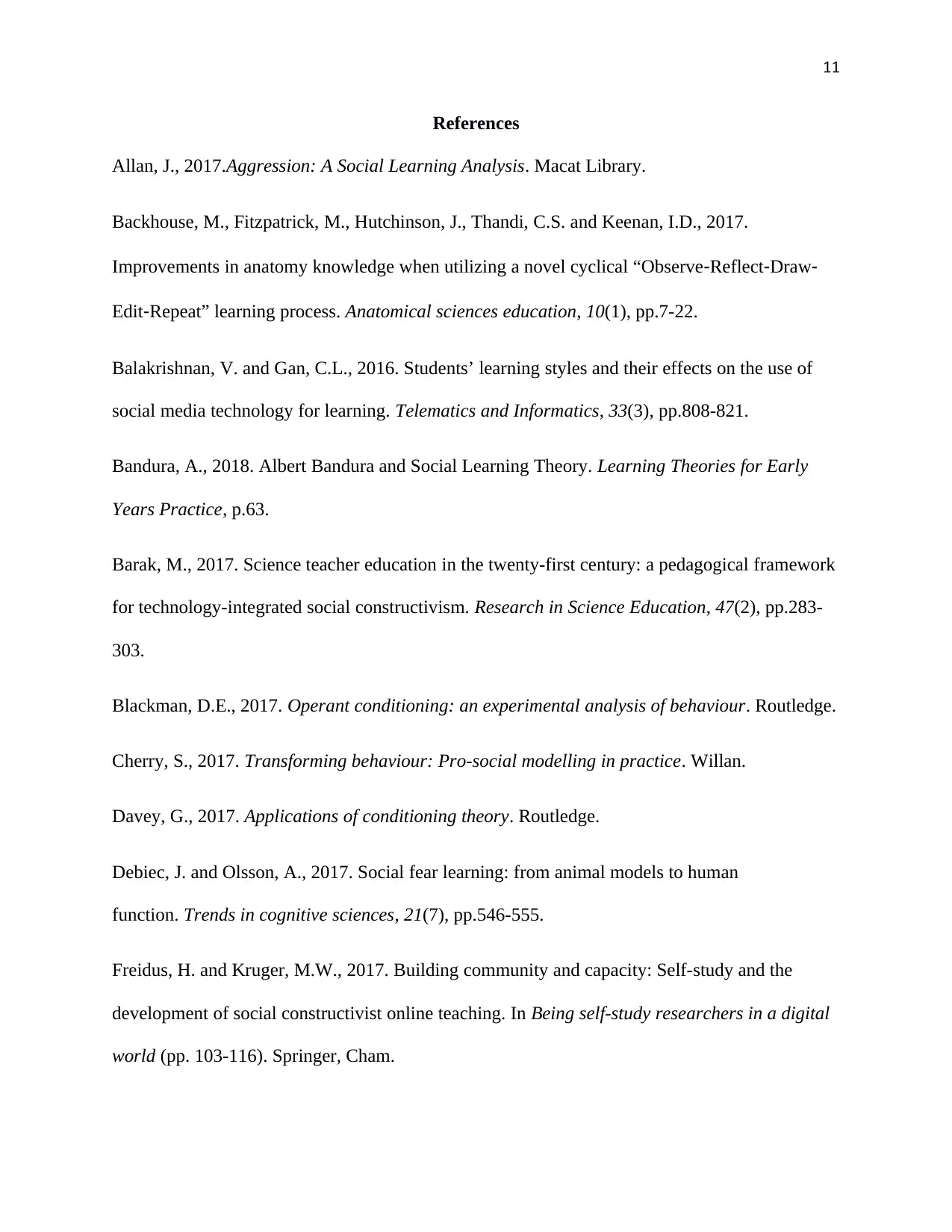
11
References
Allan, J., 2017.Aggression: A Social Learning Analysis. Macat Library.
Backhouse, M., Fitzpatrick, M., Hutchinson, J., Thandi, C.S. and Keenan, I.D., 2017.
Improvements in anatomy knowledge when utilizing a novel cyclical “Observe‐Reflect‐Draw‐
Edit‐Repeat” learning process. Anatomical sciences education, 10(1), pp.7-22.
Balakrishnan, V. and Gan, C.L., 2016. Students’ learning styles and their effects on the use of
social media technology for learning. Telematics and Informatics, 33(3), pp.808-821.
Bandura, A., 2018. Albert Bandura and Social Learning Theory. Learning Theories for Early
Years Practice, p.63.
Barak, M., 2017. Science teacher education in the twenty-first century: a pedagogical framework
for technology-integrated social constructivism. Research in Science Education, 47(2), pp.283-
303.
Blackman, D.E., 2017. Operant conditioning: an experimental analysis of behaviour. Routledge.
Cherry, S., 2017. Transforming behaviour: Pro-social modelling in practice. Willan.
Davey, G., 2017. Applications of conditioning theory. Routledge.
Debiec, J. and Olsson, A., 2017. Social fear learning: from animal models to human
function. Trends in cognitive sciences, 21(7), pp.546-555.
Freidus, H. and Kruger, M.W., 2017. Building community and capacity: Self-study and the
development of social constructivist online teaching. In Being self-study researchers in a digital
world (pp. 103-116). Springer, Cham.
References
Allan, J., 2017.Aggression: A Social Learning Analysis. Macat Library.
Backhouse, M., Fitzpatrick, M., Hutchinson, J., Thandi, C.S. and Keenan, I.D., 2017.
Improvements in anatomy knowledge when utilizing a novel cyclical “Observe‐Reflect‐Draw‐
Edit‐Repeat” learning process. Anatomical sciences education, 10(1), pp.7-22.
Balakrishnan, V. and Gan, C.L., 2016. Students’ learning styles and their effects on the use of
social media technology for learning. Telematics and Informatics, 33(3), pp.808-821.
Bandura, A., 2018. Albert Bandura and Social Learning Theory. Learning Theories for Early
Years Practice, p.63.
Barak, M., 2017. Science teacher education in the twenty-first century: a pedagogical framework
for technology-integrated social constructivism. Research in Science Education, 47(2), pp.283-
303.
Blackman, D.E., 2017. Operant conditioning: an experimental analysis of behaviour. Routledge.
Cherry, S., 2017. Transforming behaviour: Pro-social modelling in practice. Willan.
Davey, G., 2017. Applications of conditioning theory. Routledge.
Debiec, J. and Olsson, A., 2017. Social fear learning: from animal models to human
function. Trends in cognitive sciences, 21(7), pp.546-555.
Freidus, H. and Kruger, M.W., 2017. Building community and capacity: Self-study and the
development of social constructivist online teaching. In Being self-study researchers in a digital
world (pp. 103-116). Springer, Cham.
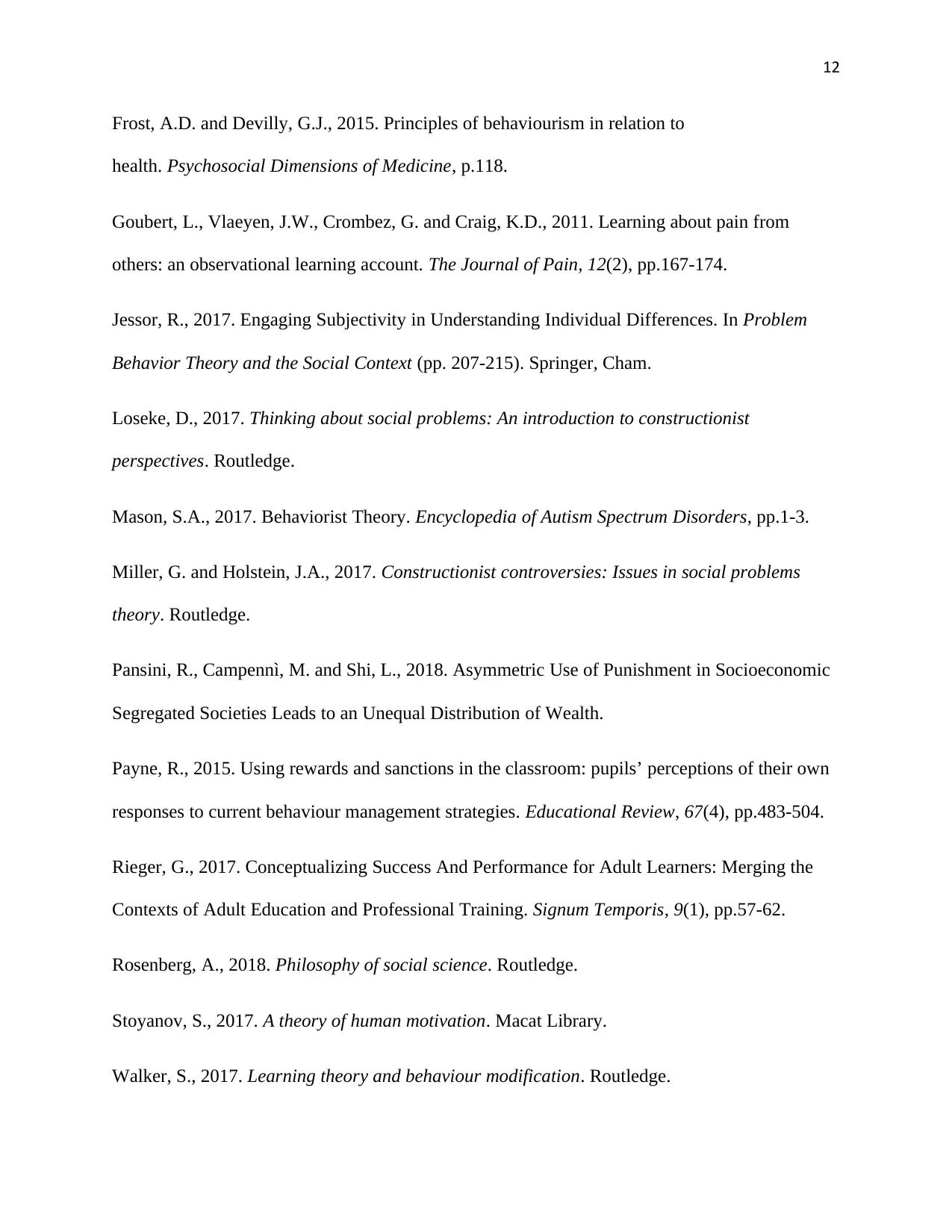
12
Frost, A.D. and Devilly, G.J., 2015. Principles of behaviourism in relation to
health. Psychosocial Dimensions of Medicine, p.118.
Goubert, L., Vlaeyen, J.W., Crombez, G. and Craig, K.D., 2011. Learning about pain from
others: an observational learning account. The Journal of Pain, 12(2), pp.167-174.
Jessor, R., 2017. Engaging Subjectivity in Understanding Individual Differences. In Problem
Behavior Theory and the Social Context (pp. 207-215). Springer, Cham.
Loseke, D., 2017. Thinking about social problems: An introduction to constructionist
perspectives. Routledge.
Mason, S.A., 2017. Behaviorist Theory. Encyclopedia of Autism Spectrum Disorders, pp.1-3.
Miller, G. and Holstein, J.A., 2017. Constructionist controversies: Issues in social problems
theory. Routledge.
Pansini, R., Campennì, M. and Shi, L., 2018. Asymmetric Use of Punishment in Socioeconomic
Segregated Societies Leads to an Unequal Distribution of Wealth.
Payne, R., 2015. Using rewards and sanctions in the classroom: pupils’ perceptions of their own
responses to current behaviour management strategies. Educational Review, 67(4), pp.483-504.
Rieger, G., 2017. Conceptualizing Success And Performance for Adult Learners: Merging the
Contexts of Adult Education and Professional Training. Signum Temporis, 9(1), pp.57-62.
Rosenberg, A., 2018. Philosophy of social science. Routledge.
Stoyanov, S., 2017. A theory of human motivation. Macat Library.
Walker, S., 2017. Learning theory and behaviour modification. Routledge.
Frost, A.D. and Devilly, G.J., 2015. Principles of behaviourism in relation to
health. Psychosocial Dimensions of Medicine, p.118.
Goubert, L., Vlaeyen, J.W., Crombez, G. and Craig, K.D., 2011. Learning about pain from
others: an observational learning account. The Journal of Pain, 12(2), pp.167-174.
Jessor, R., 2017. Engaging Subjectivity in Understanding Individual Differences. In Problem
Behavior Theory and the Social Context (pp. 207-215). Springer, Cham.
Loseke, D., 2017. Thinking about social problems: An introduction to constructionist
perspectives. Routledge.
Mason, S.A., 2017. Behaviorist Theory. Encyclopedia of Autism Spectrum Disorders, pp.1-3.
Miller, G. and Holstein, J.A., 2017. Constructionist controversies: Issues in social problems
theory. Routledge.
Pansini, R., Campennì, M. and Shi, L., 2018. Asymmetric Use of Punishment in Socioeconomic
Segregated Societies Leads to an Unequal Distribution of Wealth.
Payne, R., 2015. Using rewards and sanctions in the classroom: pupils’ perceptions of their own
responses to current behaviour management strategies. Educational Review, 67(4), pp.483-504.
Rieger, G., 2017. Conceptualizing Success And Performance for Adult Learners: Merging the
Contexts of Adult Education and Professional Training. Signum Temporis, 9(1), pp.57-62.
Rosenberg, A., 2018. Philosophy of social science. Routledge.
Stoyanov, S., 2017. A theory of human motivation. Macat Library.
Walker, S., 2017. Learning theory and behaviour modification. Routledge.
⊘ This is a preview!⊘
Do you want full access?
Subscribe today to unlock all pages.

Trusted by 1+ million students worldwide
1 out of 13
Related Documents
Your All-in-One AI-Powered Toolkit for Academic Success.
+13062052269
info@desklib.com
Available 24*7 on WhatsApp / Email
![[object Object]](/_next/static/media/star-bottom.7253800d.svg)
Unlock your academic potential
Copyright © 2020–2026 A2Z Services. All Rights Reserved. Developed and managed by ZUCOL.





